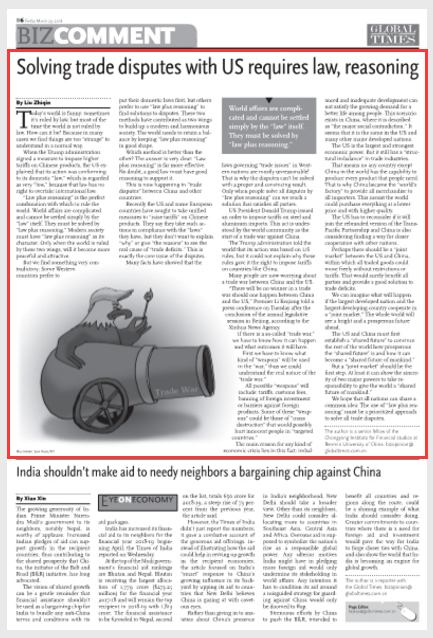Major Power Relations
Your Present Location: PROGRAMS> Major Power RelationsLiu Zhiqin: Solving trade disputes with US requires law, reasoning
By Liu Zhiqin Source: Global Times Published: 2018-3-22
Today`s world is funny: sometimes it`s ruled by law, but most of the time the world is not ruled by law. How can it be? Because in many cases we find things are too "strange" to understand in a normal way.
When the Trump administration signed a measure to impose higher tariffs on Chinese products, the US explained that its action was conforming to its domestic "law," which is regarded as very "low," because that law has no right to overtake international law.

"Law plus reasoning" is the perfect combination with which to rule the world. World affairs are complicated and cannot be settled simply by the "law" itself. They must be solved by "law plus reasoning." Modern society must have "law plus reasoning" as its character. Only when the world is ruled by these two wings, will it become more peaceful and attractive.
But we find something very contradictory: Some Western countries prefer to put their domestic laws first, but others prefer to use "law plus reasoning" to find solutions to disputes. These two methods have contributed as two wings to build up a modern and harmonious society. The world needs to retain a balance by keeping "law plus reasoning" in good shape.
Which method is better than the other? The answer is very clear: "Law plus reasoning" is far more effective. No doubt, a good law must have good reasoning to support it.
This is now happening in "trade disputes" between China and other countries.
Recently the US and some European countries have sought to take unified measures to "raise tariffs" on Chinese products. They say they take such actions in compliance with the "laws" they have, but they don`t want to explain "why" or give "the reasons" to see the real cause of "trade deficits." This is exactly the core issue of the disputes.
Many facts have showed that the laws governing "trade issues" in Western nations are mostly unreasonable! That is why the disputes can`t be solved with a proper and convincing result. Only when people solve all disputes by "law plus reasoning" can we reach a solution that satisfies all parties.
US President Donald Trump issued an order to impose tariffs on steel and aluminum imports. This act is understood by the world community as the start of a trade war against China.
The Trump administration told the world that its action was based on US rules, but it could not explain why these rules gave it the right to impose tariffs on countries like China.
Many people are now worrying about a trade war between China and the US.
"There will be no winner in a trade war should one happen between China and the US," Premier Li Keqiang told a press conference on Tuesday after the conclusion of the annual legislative session in Beijing, according to the Xinhua News Agency.
If there is a so-called "trade war," we have to know how it can happen and what outcomes it will have.
First we have to know what kind of "weapons" will be used in the "war," thus we could understand the real nature of the "trade war."
All possible "weapons" will include: tariffs, customs fees, banning of foreign investment or barriers against foreign products. Some of these "weapons" could be those of "mass destruction" that would possibly hurt innocent people in "targeted countries."
The main reason for any kind of economic crisis lies in this fact: imbalanced and inadequate development can not satisfy the growing demand for a better life among people. This scenario exists in China, where it is described as "the major social contradiction." It seems that it is the same in the US and many other major developed nations.
The US is the largest and strongest economic power. But it still has a "structural imbalance" in trade industries.
That means no any country except China in the world has the capability to produce every product that people need. That is why China became the "world`s factory" to provide all merchandise to all importers. This meant the world could purchase everything at a lower price and with higher quality.
The US has to reconsider if it will join the rebranded version of the Trans-Pacific Partnership and China is also considering finding a way for closer cooperation with other nations.
Perhaps there should be a "joint market" between the US and China, within which all traded goods could move freely without restrictions or tariffs. That would surely benefit all parties and provide a good solution to trade deficits.
We can imagine what will happen if the largest developed nation and the largest developing country cooperate in a "joint market." The whole world will see a bright and a prosperous future ahead.
The US and China must first establish a "shared future" to convince the rest of the world how prosperous the "shared future" is and how it can become a "shared future of mankind."
But a "joint market" should be the first step. At least it can show the sincerity of two major powers to take responsibility to give the world a "shared future of mankind."
We hope that all nations can share a common idea: The use of "law plus reasoning" must be a prioritized approach to solve all trade disputes.
The author is a senior fellow of the Chongyang Institute for Financial studies at Renmin University of China.
Key Words: China; US; trade; Liu Zhiqin























































































 京公网安备 11010802037854号
京公网安备 11010802037854号





